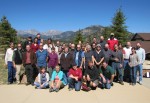The Information Managers Committee (IMC) – one of the most active committees in the Network – met all day on Sunday, September 9, 2012. Attendance at the morning session was about 40, including site representatives and personnel from the LTER Network Office. In the afternoon, a dozen more participants from the iLTER community joined us.During the meeting, the IMC recognized two outgoing members of the leadership team, Don Henshaw (AND) and Sven Bohm (KBS). The current committee leadership roster is posted at http://im.lternet.edu/imexec.
NSF program managers, Saran Twombly and Peter McCartney, joined us for part of the day, giving Dr. Twombly her first opportunity to meet the entire committee. Twombly has been very interested in learning about data management issues in LTER and the IMC appreciates her active and supportive involvement. Dr. McCartney participated in the afternoon session.
Activities at the meeting focused on contributions to the network data catalog. We now have PASTA-related tools for gauging the structural quality of data and metadata. To take advantage of these tools and help advance network science, the IMC formed a new working group tasked with designing reports on site data quality and availability. These reports will be tailored for all our stakeholders, including site scientists, the Executive Board, and NSF.
Throughout its history, the IMC has taken advantage of economies of scale to collaborate on improvements to our local systems. In 2012, these collaborations accelerated at a nearly unprecedented rate, thanks to the injection of supplement money from NSF. The supplements also funded several projects that were awaiting funding opportunities.
Collaborative and site-based projects were featured in ASM working groups and posters, and informatics-related posters were contributed from virtually every site, encompassing all aspects of data management. In addition, information managers organized several ASM working groups and were deeply involved with other groups specifically focused on data for synthesis. Within the broader field of ecology, these working groups and poster presentations suggest that LTER continues its leadership in developing environmental informatics solutions. As collaborations continue, we expect more cooperation between information managers and scientists.
The IMC would, therefore, like to remind scientific working groups that the best way for information managers to help meet community scientific needs of the Network is through early involvement in synthesis efforts. Please involve us from the early planning stages of synthesis projects. All the information managers have some level of expertise in areas of ecology or environmental science and can help navigate the technological issues involved in synthesis. The result will not only be more efficient data processing, but also more usable data products with greater lasting value.
By Margaret O’Brien (SBC) and John Chamblee (CWT)

 Enlarge this image
Enlarge this image
